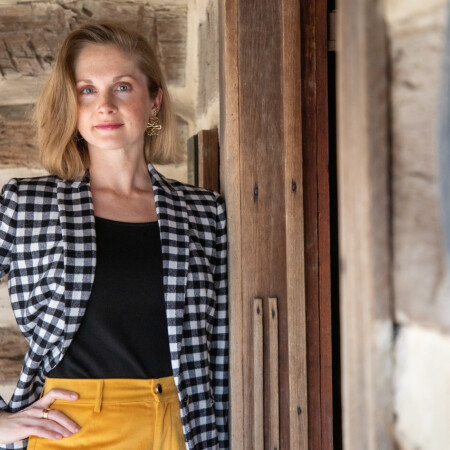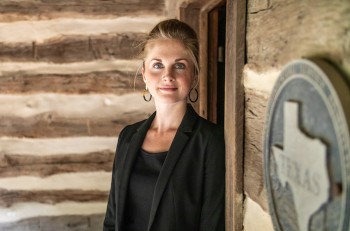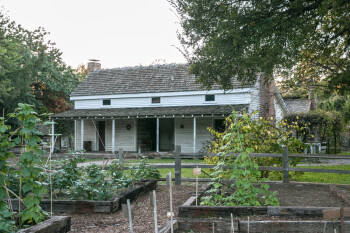PhD - History
Rice University - 2017

Whitney Nell Stewart
Associate Professor of History
Faculty, Edith O'Donnell Institute of Art History
Professional Preparation
MA - History
Rice University - 2013
Rice University - 2013
BA - History
University of St. Thomas - 2009
University of St. Thomas - 2009
Research Areas
US South
Texas History
Slavery & Race
Material and Visual Culture
Public History
Publications
“A ‘Vigorous Crusade’ Against the One-Room Cabin: Black Activists, Usable History, and Anti-Historic Preservation in the Jim Crow Era,” in Race and the Historiography of American Architecture, eds. Charles Davis, Kathryn Holliday, and Joanna Merwood-Salisbury (under contract with University of Texas Press). - publications
Co-author, “Digital Public History at Three Presidential Home Sites,” in Age of Revolutions in the Digital Age, eds. Nora Slonimsky, Mark Boonshoft, and Ben Wright (Ithaca, NY: Cornell University Press, 2024). 2024 - publications
This Is Our Home: Slavery and Struggle on Southern Plantations (Chapel Hill: University of North Carolina Press, 2023). 2023 - publications
“White/white and/or the Absence of the Modifier,” Journal of the Early Republic 43, no. 1 (Spring 2023): 101–108. 2023 - publications
“A Protected Place: The Material Culture of Home-Making for Stagville’s Enslaved Residents,” Winterthur Portfolio 54, no. 4 (Winter 2020), 245–70. 2021 - publications
“Fashioning Frenchness: Gens de Couleur Libres and the Cultural Struggle for Power in Antebellum New Orleans,” Journal of Social History 51, no. 3 (February 2018), 526–56. 2018 - publications
Co-editor, Race and Nation in the Age of Emancipations: An Atlantic World Anthology (Athens: University of Georgia Press, 2018). 2018 - publications
“The Material Culture of Freedom: African American Women and the Southern Free Black Home after the Civil War,” in Creators and Consumers: Women and Material Culture and Visual Art in 19th-Century Texas, the Lower South, and the Southwest, The David B. Warren Symposium, vol. 5 (Houston: The Museum of Fine Arts, Houston, 2016), 46–58. 2016 - publications
Awards
2024 James Broussard Best First Book Prize - Society for Historians of the Early American Republic [2024]
2024 Ramirez Prize for Most Significant Scholarly Work - Texas Institute of Letters [2024]
Swan Foundation Short-Term Residential Research Fellowship for Revolutionary-Era Material Culture - American Philosophical Society [2024]
George Washington Presidential Library Fellowship - Mount Vernon [2024]
Batten and First Union Domestic Fellow - Robert H. Smith International Center for Jefferson Studies [2024]
The Center for History and Culture of Southeast Texas and the Upper Gulf Coast Fellowship - Lamar University [2023]
Portal to Texas History Research Fellowship - University of North Texas Libraries [2023]
AAS-National Endowment for the Humanities Long-Term Fellowship - National Endowment for the Humanities & American Antiquarian Society [2019]
Cecilia Steinfeldt Fellowship for Research in the Arts and Material Culture - Texas State Historical Association [2019]
Glenn R. Conrad Prize for the Best Published Article on Louisiana History for 2018 - Louisiana Historical Association [2019]
Appointments
Chair- Membership Committee
Southern Historical Association [2022–Present]
Southern Historical Association [2022–Present]
Member- Interpretation, Diversity, Equity and Accessibility Committee
Dallas Heritage Village [2019–Present]
Dallas Heritage Village [2019–Present]
Member- Membership Committee
Southern Historical Association [2019–2022]
Southern Historical Association [2019–2022]
Co-advisor
Phi Alpha Theta, History Honors Society, UTD chapter [2020–Present]
Phi Alpha Theta, History Honors Society, UTD chapter [2020–Present]
Member- Public History Sub-Committee
Southern Historical Association [2020–Present]
Southern Historical Association [2020–Present]
Additional Information
As a history professor at UTD, I am delighted to teach a range of classes, from introductory surveys to graduate-level courses. I think, read, and work as both an academic and public historian, meaning I'm interested not only in scholarly historical practice, but in history that reaches a wider audience. Museums, parks, documentaries, websites: there are so many places where the public interacts with history.
My award-winning book, This Is Our Home: Slavery and Struggle Southern Plantations (University of North Carolina Press, 2023), explores how both enslaved and enslaving residents of plantations in the nineteenth-century US South used their built environment and material culture to make home. Plantations were work camps; they were places of forced labor, violence, and repression. Yet the material culture that enslaved people created, used, and discarded reveals that these sites of slavery may have been more. On plantations across the US South, across the early Republic and antebellum eras, enslaved and enslaving residents contested who had the right to make home and how they would do it. Amidst the brutal constraints slavery placed upon enslaved people, their material culture reveals that they nonetheless attempted to realize a semblance of home. This fight continued long after the end of slavery with segregation, inequitable housing policies, and surveillance of black homes in the twentieth and twenty-first centuries. This Is Our Home has been heralded as a “game-changer” and “must read” for African American history, southern history, material culture studies, and public history.
My two current book projects continue to explore how slavery and plantations shape understandings of the American past and present. Bitter Vines: Wine and Slavery in the United States will be the first work to uncover the conjoined deep roots of two American institutions. Wine and slavery converged in surprising places across the North American continent, but it was on southern plantations that experiments in a new slave-based wine industry flourished. I am also writing a narrative-driven, accessible history of a historic plantation site that exposes the convoluted yet consequential intersection of Texas with the American South. By engaging in place-based stories that range more than two centuries, The Story of Texas: History-Making at Varner-Hogg Plantation makes the case that we cannot understand contemporary life without engaging with the history of plantations like Varner-Hogg.
I am dedicated to doing the work of history with and in the public. Along with peer-reviewed articles, essays, and an edited collection, I have also written for broader audiences, most recently in Smithsonian Magazine where I explored the long legacy and contemporary importance of plantation sites. I meet audiences where they are, including through podcasts, physical and digital exhibits, and lectures at museums, historic sites, and libraries. I have cultivated skills of leadership, collaboration, and adaptability through spearheading teams of staff, volunteers, and students; chairing committees on research and interpretation; conducting national and regional reviews; and working with guides and educators on audience engagement.
Over the last few years, I have had the honor of consulting for prominent national, state, and local organizations like the U.S. National Park Service, Communities Foundation of Texas, Old City Park, Close Concerns, and San Antonio Museum of Art. I am currently the lead researcher, historian, and co-author on a historic context survey for the National Park Service. This important work will evaluate whether an 11-mile stretch of the Great River Road in Louisiana—an area of great historical import but which now is highly industrialized and known as “Cancer Alley”—is eligible to apply for a National Historic Landmark designation, a classification that would assist the community in preserving and promoting its history amidst the potential further degradation of the area’s historical resources and environment. I am dedicated to consulting on projects that help preserve, promote, and tell histories that are at risk of being forgotten, erased, or undervalued.
I have had the pleasure of teaching more than 1600 students at UTD. My undergraduate classes include survey-level courses on US History and Texas History, as well as upper-level courses such as the Many Slaveries of Texas and History of the US South to 1865. Graduate courses include Texas History, Public History, and Material Culture. As a teacher, I empower my students with the tools, knowledge, and experiences to better navigate their studies, their future employment, and their world. I approach my students with empathy and kindness as a way of demonstrating how to approach not only those in the past but those in the present. I show them what it means to be a historian—to ask questions, research, analyze, contextualize, think critically, communicate effectively—and require that they do the same, for these skills are useful no matter their job. The content of my courses is often difficult, for the history of this state, region, and nation is complicated and at times uncomfortable. But I ask them to approach it, and one another, with openness and respect. Throughout it all, we connect history to our own time, contemplating how the past shaped our present and what we might do to make a better future.
News Articles
Engineering Researcher, U.S. Historian Earn Recognition
Dr. Whitney Nell Stewart, assistant professor of history in the Harry W. Bass Jr. School of Arts, Humanities, and Technology at The University of Texas at Dallas, has been awarded a pair of research fellowships to study at George Washington’s Mount Vernon and Thomas Jefferson’s Monticello.History Professor Explores Nature of ‘Home’ in 19th-Century South
 According to Dr. Whitney Stewart, there’s a different way to tell the story of how people lived during the antebellum period in the U.S. By looking at the objects found at old plantations, for example, the disparity of life in the South becomes clearer.
According to Dr. Whitney Stewart, there’s a different way to tell the story of how people lived during the antebellum period in the U.S. By looking at the objects found at old plantations, for example, the disparity of life in the South becomes clearer."I study how race as an idea, as a construct, becomes reality through the things we create, consume and discard,” said Stewart, an assistant professor of history in the School of Arts and Humanities and an affiliate of the Edith O’Donnell Institute of Art History at The University of Texas at Dallas. “Whether a quilt, a piece of furniture, landscaping or architecture, I’m interested in how we inscribe our own ideas of race into those spaces and objects.”
Stewart is writing a book that explores the racialized nature of “home” in the 19th-century South. In it, she explores plantations in Texas and Louisiana and how African Americans were motivated to create their homes during and after slavery, as well as the ramifications that have come from a racialized understanding of home.
History Students Try To Uncover Untold Stories of 19th-Century House
 Students in a public history graduate course at The University of Texas at Dallas are hoping their research will help enhance the narrative of a local house built in the 1840s.
Students in a public history graduate course at The University of Texas at Dallas are hoping their research will help enhance the narrative of a local house built in the 1840s.According to Dr. Whitney Stewart, assistant professor of history in the School of Arts and Humanities, the purpose of the spring project was to dig deep into historical sources to find untold stories about the Gano Farmstead at Dallas Heritage Village (DHV) at Old City Park.
“These students had a great opportunity to do practical hands-on public history research that otherwise they would not have been able to do,” she said. “I saw it as a chance for both DHV and my students to gain something.”